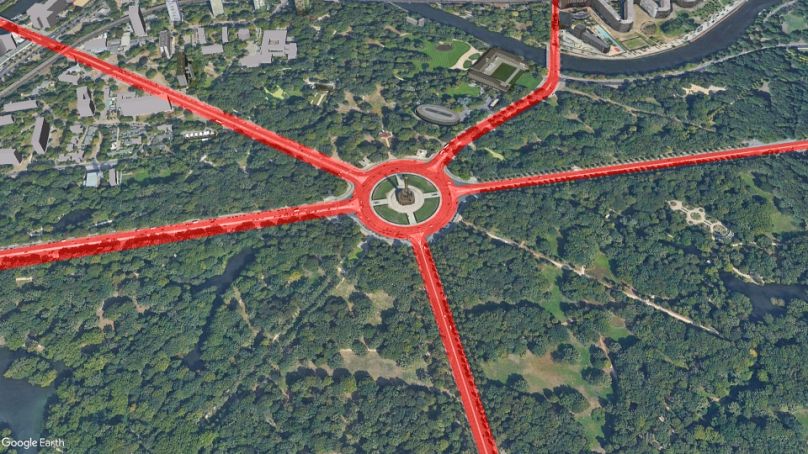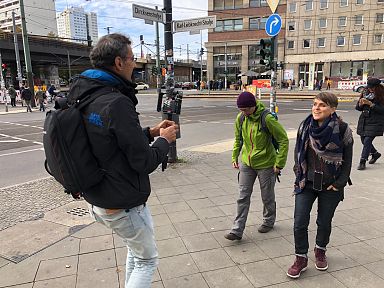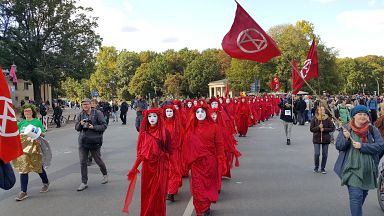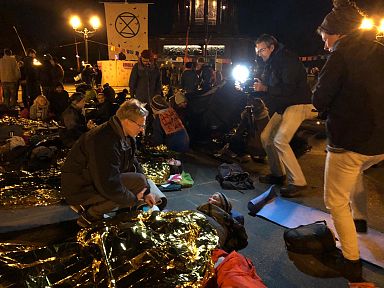Euronews embeds with the group at a planned civil disobedience mission called “Rebels Ark” which blocked the city’s Grosser Stern – a huge five-lane roundabout linking north to south and east to west.
A group of climate change activists, who are part of the international Extinction Rebellion movement, boarded a Berlin-bound high-speed train with an aim to block the German capital. The protest was part of many global demos during October. The group was on a secretly planned civil disobedience mission called "Rebels Ark". A replica wooden ark is set to block a road but it's not yet known which road this will be.
The movement's plan was to block capitals all over the world, to get governments to take action to save the planet.
Extinction Rebellion was founded nearly a year ago (31 Oct) in the United Kingdom and quickly spread across the globe. In Germany, there are now around a hundred local groups.
Activist: "Time is running out"
On the train journey, Euronews spoke to Norman Schumann who is a mathematician and one of the decision-makers of the climate protest group. He's taken a year off work to give his time to the movement.
"Last summer, I saw nature dying because of the heatwave. I understood: time is running out. We have to take action, urgently. We have to act now," said Schumann.
Activist: "I'm deeply shocked"
People from all walks of life and from many political parties have joined the Extinction Rebellion. From German society, there are nurses, teachers, artists, carpenters, publishers, bankers and IT developers such as Tobias.
"I am deeply shocked and dismayed about how most people treat our planet," said Tobias, "We just have eight years left (before it is too late for a change). I believe, that Extinction Rebellion should move on this non-violent - but radical path. At least we should try to save something."
At Berlin central station, Norman and his protest group were closely watched by police.
Schumann tells Euronews, "We will launch civil disobedience actions and we will block Berlin. We will put in place roadblocks to express our discontent with climate politics. The governments to blame for not taking action."
The activists put up their tents in front of Bundeskanzleramt, Angela Merkel's workplace.
Meanwhile, activists from Poland and Scandinavia went to support the movement in Berlin. Jorgen and Ronn are from Norway.
"We are here in Berlin to make a stand," said Jorgen, "To wake people up, to see that the truth is being told and everyone sees how critical this (climate situation) is."
Ronn said, "Join the movement to stop using fossil fuels."
Early start
At two o'clock in the morning, they all get up to find out where they have to go. The activist's "Rebels Ark" operation is made in secret to avoid early interception from the police and the location is only revealed at the last minute, as the protesters find out that Berlin's huge five-lane roundabout linking north to south and east to west is to be completely blocked at Grosser Stern.
This map shows the major routes which were affected.
Activists tried to block police officers so the group could unload the wooden blocks to build the ark but authorities stepped in.
Joergen said, "Well, we were hoping to build the ark as a symbol, a boat that is saving the species. Well, we will still try, but I am not sure if we will succeed yet. We are chaining up here to make it possible to do the building."
"The government must absolutely declare a state of climate emergency," said Schumann. "We need a citizens assembly to have the slightest chance to handle those incalculable consequences, triggered by the climate crisis."
Police negotiate with activists
As dawn arrives, police and protesters calmly discuss the situation and the Extinction Rebellion group agrees to move the ark and agree on boundaries.
Protest movements such as Fridays for Future demonstrate with billboards, Extinction Rebellion opts for direct action with no violence against people or things. The rapidly growing movement refers to passive resistance strategies.
Meanwhile, the Berlin police and local government decided not to intervene and told the group not to demonstrate at airports or affect vital infrastructures but they tolerated the major roadblock across the capital.
Is the German government listening?
Schumann and other leading activists have been invited to a confidential tete-a-tete at Germany's environment ministry. It'll be an informal two hours discussion.
Other protests happened at other significant places in the city at the same time; blocking traffic at Potsdamer Platz; blocking the Ministry of Environment; blocking various crucial bridges in central Berlin and at symbolic places such as at The Christian Democratic Union of Germany(CDU) headquarters.
Volker Quaschining is Germany's scientific social media star and a professor in renewable energy and a founder of the group "Scientists for Future". He said the government's climate package doesn't meet the needs to combat global warming.
"Have a look at other countries, for example, Sweden, they have a tax on CO2 emissions, currently at over 100 Euros per ton of CO2. That is ten times the tax proposed in Germany," Quaschining said, "And even in Sweden, they are to slow to meet their climate protection targets."
Extinction Rebellion demands a Citizen's Assembly
Extinction Rebellion wants governments to create a Citizen's Assembly. It wants people from all demographic backgrounds to make recommendations for governments to respond to climate change. This is a system already used in Europe, in The Netherlands, Ireland, Belgium, Poland, and other countries.
This system empowers citizens to work together and take responsibility. Assembly members listen to balanced information from experts and those people most affected by the emergency. Members are heard openly and honestly in small groups together with professional facilitators and are run by non-governmental organisations (NGO's) for independence.
The second night of protests
As the sun set, protesters prepared for a second night outside, continuing to block the five lanes of the roundabout.
Schumann is happy with the protest, and said, "Today was absolutely a great success. It still is a great success. We came to stay. And we are still here. The ark stands. That was our plan. And the ark will stay. Now, we prepare for the night, we are looking ahead, whatever happens, we will persist."
The group stayed for 58 hours and left to go to another protest.
Even though there's criticism of the movement's actions, stopping people from getting to hospitals or to work, Extinction Rebellion said it will continue to organise mass peaceful disruptions until the government's across the globe declare a climate and ecological emergency.




